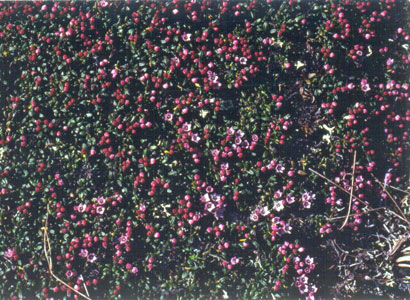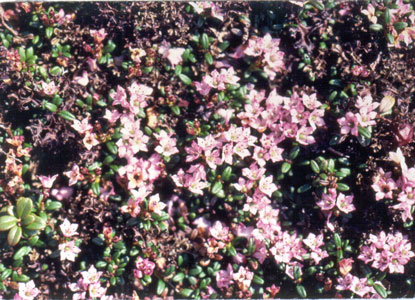DACF Home → Bureaus & Programs → Maine Natural Areas Program → Communities, Plants, and Animals → Rare Plants → Loiseleuria procumbens

Loiseleuria procumbens (L.) Desv.
Alpine Azalea
- State Rank: S1
- Global Rank: G5
- State Status: Threatened
Habitat: Peaty or rocky exposed habitats. [Alpine or subalpine (non-forested, upland)]
Range: Circumboreal, south to the higher mountains of Maine, New Hampshire, and New York.
Aids to Identification: Alpine azalea is a small woody shrub which forms bushy clumps usually no more than 10 cm high. The leaves are opposite, evergreen, leathery, and only 5-8 mm long. The pink or white flowers grow in clusters from the upper leaf-axils and are shaped like a crown due to fusion of the lower half of the petals and mature as a 2- or 3-valved capsule.

Ecological characteristics: In Maine, this species is found above treeline on Mt. Katahdin.
Phenology: Flowers June - August.
Family: Ericaceae
Synonyms: Referred to in some very old treatments as Chamaecistus procumbens (L.) Kuntze.
Known Distribution in Maine: This rare plant has been documented from a total of 1 town(s) in the following county(ies): Piscataquis.
Dates of documented observations are: 1847, 1940, 1953, 1980, 1994, 2000
Reason(s) for rarity: An arctic species disjunct from its principal range.
Conservation considerations: Uneducated or unscrupulous people have been known to pluck up alpine azalea plants from Katahdin for alpine gardens; this is illegal and could be harmful to the population. Wild plants need to be left undisturbed.